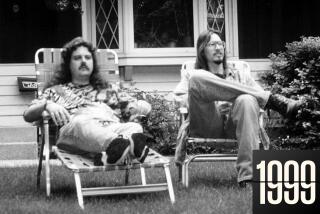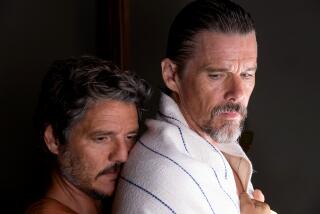The new frontier of ‘Brokeback’ is vast and heartfelt
“Brokeback Mountain” is a groundbreaking film because it isn’t. It’s a deeply felt, emotional love story that deals with the uncharted, mysterious ways of the human heart just as so many mainstream films have before it. The two lovers here just happen to be men.
Big star vehicles with homosexual protagonists are, of course, not new; one of them, 1993’s “Philadelphia,” even won a best actor Oscar for star Tom Hanks. But these films invariably have had an air of earnest special pleading about them, a sense that they’d rather do good in the world than tell a good story. Instead of emphasizing its apartness, “Brokeback Mountain” insists it is a romance like any other, and that makes all the difference.
Confidently directed by Ang Lee and featuring sensitive and powerful performances by Jake Gyllenhaal and a breathtaking Heath Ledger, this film is determined to involve us in the naturalness and even inevitability of its epic, complicated love story. What Larry McMurtry (who co-wrote the screenplay with Diana Ossana) said of Pulitzer Prize winner E. Annie Proulx’s original short fiction is equally true of the film: “It was a story that had been sitting there for years, waiting to be told.”
That lack of affect befits the nature of its protagonists, who begin as a pair of 19-year-old cowboys in Wyoming ranch country circa 1963. In Proulx’s words, Ennis del Mar (Ledger) and Jack Twist (Gyllenhaal) were “rough-mannered, rough-spoken, inured to the stoic life,” men who would mightily resist an avowedly gay lifestyle or even the label homosexual. Even after sex, Ennis could insist “I’m not no queer,” with Jack adding, “Me neither. A one-shot thing. Nobody’s business but ours.” If great love stories are about obstacles (and they often are), this one has them to spare.
“Brokeback Mountain” had obstacles of its own to contend with. Screenwriters McMurtry and Ossana optioned the story of this enduring relationship and wrote the script soon after it appeared in the New Yorker in 1997. But the “scary and sensitive” nature of the project (Ang Lee’s words) meant that it took eight years to reach the screen. Sometimes, however, good things really do come to those who are forced to wait, and it is difficult to imagine a team better suited to transferring “Brokeback Mountain” to the screen than the one that finally emerged, starting with director Lee.
A Taiwanese native, Lee is completely at home in the widest variety of situations, from the mythical China of “Crouching Tiger, Hidden Dragon” to the 18th century England of Jane Austen’s “Sense and Sensibility.” There is often something spare and removed in his direction, a willingness to be pulled back and deliberate, and those qualities enhance this film’s ability to be direct and uncluttered in telling Ennis and Jack’s story.
Even for a chameleon such as Lee, “Brokeback Mountain” has an impeccable sense of the rhythms and vistas of the remote West, a feeling for its lonely vastness and godforsaken settlements as well as its expansive beauty. For this credit the gifted Mexican cinematographer Rodrigo Prieto (“Amores Perros,” “21 Grams”) and, of course, original voice Proulx and screenwriters McMurtry and Ossana.
Taking their cues from the source, which McMurtry has called “one of the finest short stories I’ve read ... drawn precisely and convincingly,” the writing partners have fleshed out the characters and the situations very much in the spirit of Proulx’s work. It can at times seem like a bit of a stretch to expand a 31-page story into a two hour and 14 minute movie, but in fact it is the film’s patience with its material that creates its effect. For although an affair like this may seem arbitrary if heard about in the abstract or even if viewed in unconnected coming attraction clips, watching it gradually develop on screen, unfolding with a quiet, step-by-step naturalness, makes it emotionally convincing. Taking time, not being in a hurry, lends credibility to a destination everyone but the protagonists know is coming.
Ennis and Jack meet each other in front of a trailer office in Signal, Wyo., where they’re hired by rancher Joe Aguirre (a properly dyspeptic Randy Quaid) to spend the summer watching over a large herd of sheep on Brokeback Mountain. Though both men are laconic and wedded to the cowboy life (Ennis wants to be a rancher, Jack a rodeo bull-rider), there are differences between them. Jack is the showier character, the livelier wire, while Ennis is somber and grounded, the boy orphaned young who never came to trust the world.
Alone in nature’s grandness, they are drawn to each other almost without their knowing it’s happening. When the intimacy between them takes hold, it is graphic, candid, unapologetic. As Proulx writes of a later kiss, passion seizes them “easily as the right key turns the lock tumblers.” Yet, as the film is at pains to insist, it is a lonely passion that has no place in their world. Theirs is a bond unlike anything either man has known before: not because it’s a same-sex relationship but because of the strength of the feelings involved. Their closeness perplexes, confounds and confuses Ennis and Jack; it’s something they can neither explain nor control.
The summer ends and both men go off to the rest of their lives. Ennis marries his sweetheart Alma (Michelle Williams), and Jack, moving to Texas, falls into a marriage with Lureen (Anne Hathaway), a rodeo rider with a well-to-do father. They think that what happened on Brokeback Mountain is over, but it is not. For what Ennis and Jack reluctantly come to realize is that, all unawares, they have stumbled into the great love of their lives, with all the problems and complications that implies for themselves and the others in their life. In a profound sense, because of the pressures of the time and place they live in, they are lost whether together or apart, riven by the agonizing longing they feel, by the chances not taken and the choices just out of reach.
“Brokeback Mountain” would not be the success it is without excellent acting across the board. Though he is hampered by an unconvincing aging job, Gyllenhaal brings a fine harum-scarum energy and feeling to Jack’s character, and Williams, glummer than she ever was in “The Station Agent,” illuminates all the corners of Alma’s sadness. But, more than any of the others, Ledger brings this film alive by going so deeply into his character you wonder if he’ll be able to come back. Aside from his small but strong part in “Monster’s Ball,” nothing in the Australian-born Ledger’s previous credits prepares us for the power and authenticity of his work here as a laconic, interior man of the West, a performance so persuasive that “Brokeback Mountain” could not have succeeded without it. Ennis’ pain, his rage, his sense of longing and loss are real for the actor, and that makes them unforgettable for everyone else.
*
‘Brokeback Mountain’
MPAA rating: R, for sexuality, nudity, language and some violence
Times guidelines: Graphic homosexual and heterosexual encounters
Released by Focus Features. Director Ang Lee. Producers Diana Ossana, James Schamus. Executive producers William Pohlad, Larry McMurtry, Michael Costigan, Michael Hausman. Screenplay Larry McMurtry & Diana Ossana, based on the short story by E. Annie Proulx. Cinematographer Rodrigo Prieto. Editors Geraldine Peroni, Dylan Tichenor. Costumes Marit Allen. Music Gustavo Santaolalla. Production design Judy Becker. Art directors Tracey Baryski, Laura Ballinger. Set decorators Patricia Cuccia, Catherine Davis. Running time: 2 hours, 14 minutes. In limited release.
More to Read
Only good movies
Get the Indie Focus newsletter, Mark Olsen's weekly guide to the world of cinema.
You may occasionally receive promotional content from the Los Angeles Times.











